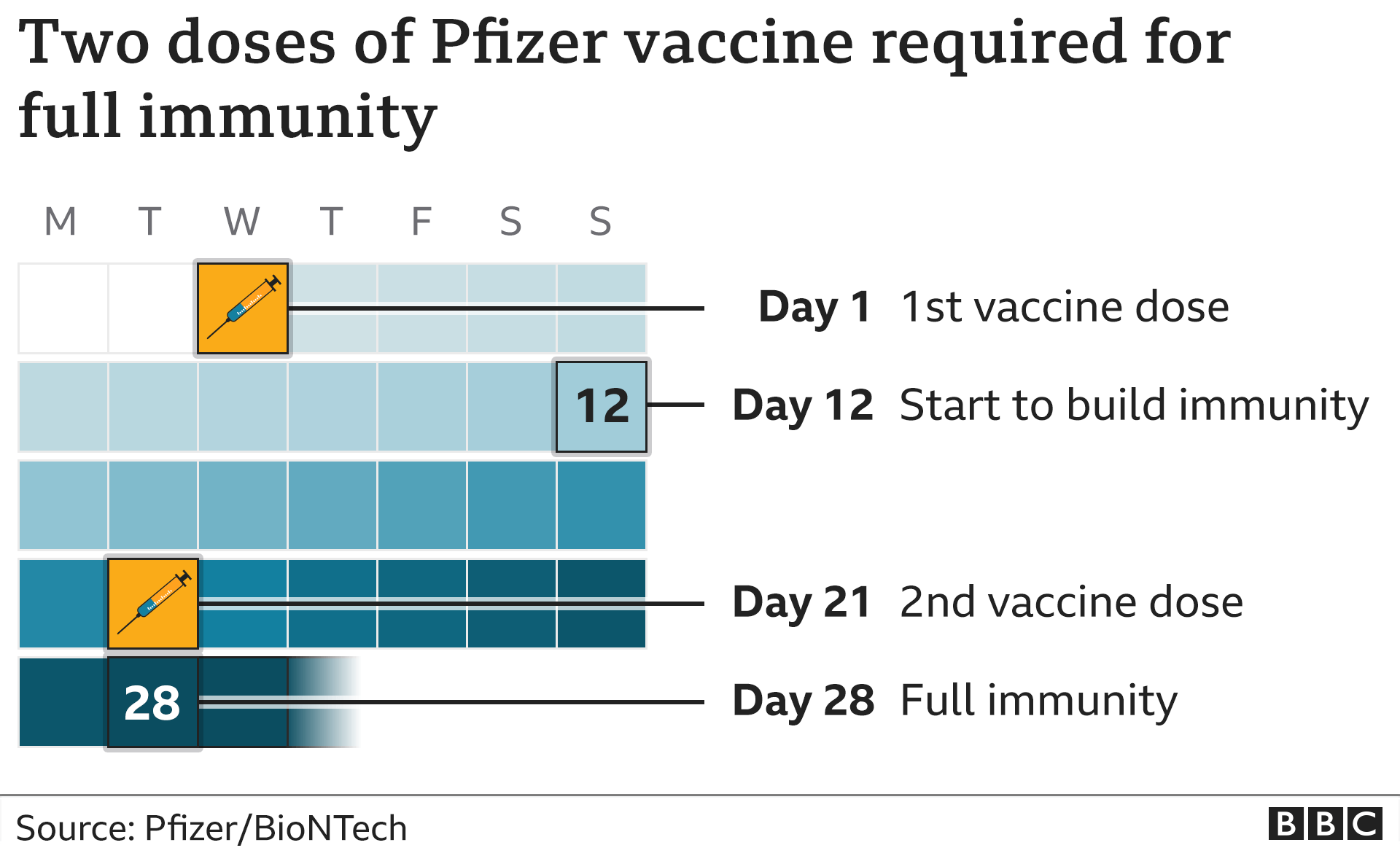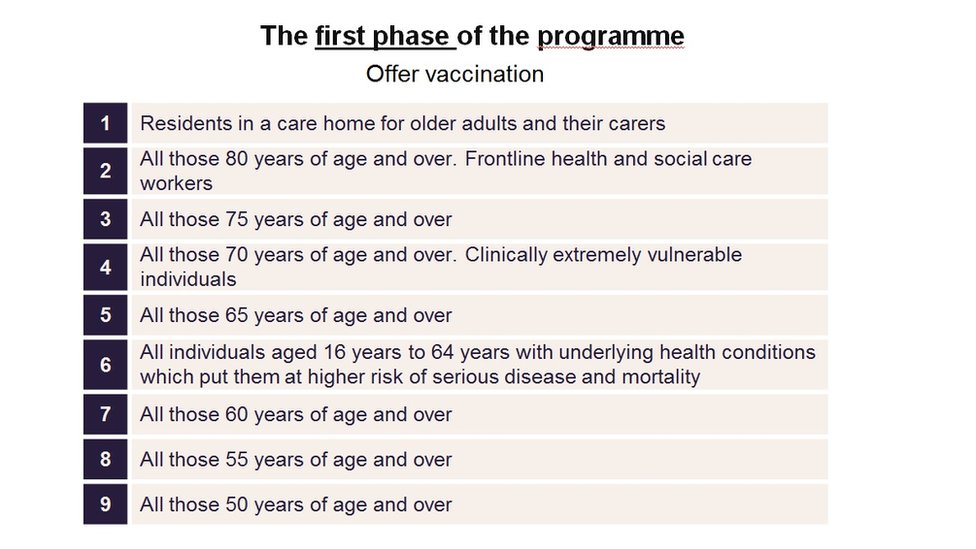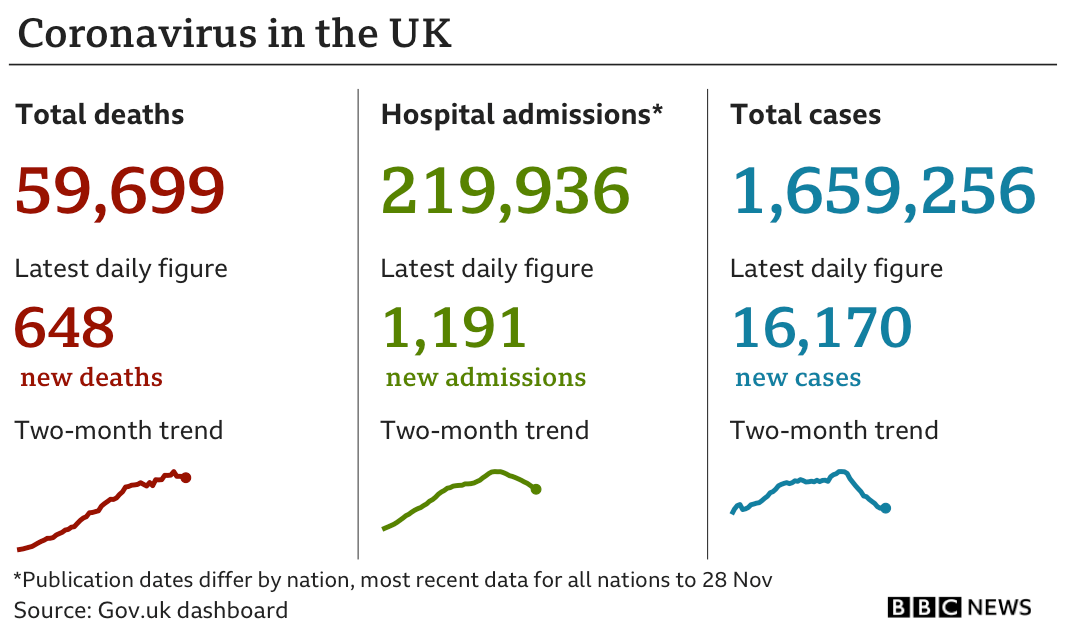People should not get "carried away with over optimism" after the UK approved its first coronavirus vaccine, Boris Johnson has warned.
The PM said it did not mean "our struggle is over", saying parts of the economy still faced tough restrictions.
England's deputy chief medical officer Jonathan Van-Tam urged patience over the rollout of the Pfizer/BioNTech jab, which begins early next week.
But care home residents will have to wait due to logistical challenges.
And it could take until April for all those most at-risk to receive the new vaccine, according to the head of NHS England.
A further 648 deaths within 28 days of a positive Covid-19 test were recorded in the UK on Wednesday, with another 16,170 cases reported.
Speaking at a Downing Street news conference, Mr Johnson said the decision to approve the Pfizer jab by regulator MHRA came amid "immense logistical challenges" in getting doses to vulnerable groups.
The vaccine needs to be stored at around -70C and comes in packs of 975 doses, which cannot yet be split into smaller batches.
Those who receive it will need a a second dose 21 days later to receive full protection.
"It's going to continue to be tough for some sectors - but until the vaccine is deployed our plan relies on all of us making sacrifices to protect the ones we love," Mr Johnson said.
Meanwhile, Labour's leader Sir Keir Starmer said the vaccine roll-out would require the "best of Britain" as he called for cross-party consensus on communications about the effort.


This is the day we have been waiting for.
But it is clear listening to NHS England chief executive Simon Stevens and England's deputy chief medical officer Prof Jonathan Van-Tam that huge logistical challenges remain.
First of all, supply. The UK is expecting 800,000 doses in the next few days. But given there are 15 million people over the age of 65 and working in health and care sectors, and all need two doses, getting more into the country is essential.
Millions more doses are promised - but how quickly they arrive remains to be seen.
Roll-out is also difficult. Through a combination of the need to keep the vaccine at ultra-cold storage and the fact that the jab comes in batches of 975 that cannot be split up at the moment, immunisation will only be offered from a network of 50 hospitals to start with.
That's because sending it to care homes, where there may be only a few dozen residents, would lead to a huge amount of vaccine being wasted.
It is why there is still so much hope pinned to the Oxford University vaccine, that regulators are currently reviewing.
That does not need to be kept in ultra-cold storage and so can be distributed much more easily. Plus there are already millions of doses in the country.

Prof Van-Tam said he had become emotional when the UK became the first country to approve the Pfizer vaccine, but he too warned that social-distancing rules would have to remain in place.
"If we relax too soon it will create a tidal wave of infections," he said.
"I don't think we are going to eradicate coronavirus ever. I think it's going to be with humankind forever," he added.
Prof Van-Tam also said that those offered the vaccine "must take it".
"We need people to take it. This vaccine isn't going to help you if you don't take it," he said.


NHS England chief executive Sir Simon Stevens said the vaccine would be rolled out to 50 hospital hubs in England, with the over-80s, care home staff and front-line NHS staff being the first to receive it from next week.
Sir Simon said vulnerable people with outpatient appointments scheduled were likely to be among the very first to be offered the jab.
The NHS is "raring to go" to vaccinate people in care homes, hopefully this month, Sir Simon said, but he admitted they would not be among the first to receive it.
Setting out the difficulties faced in getting the vaccine into care homes, he noted that the jab can only be moved a few times, and that each pack of doses cannot be easily split.
The 975 doses they contain would be too many for individual care homes, meaning the vaccine would be wasted, he explained.
Both Pfizer and BioNTech have said the jab can be sent to care homes, as long as the vaccine travels for no more than six hours after it leaves cold storage and is then put in a normal fridge at 2C to 8C.
The Pfizer/BioNTech jab is the fastest vaccine to go from concept to reality, taking only 10 months to follow the steps that normally span 10 years.
The UK has already ordered 40 million doses - enough to vaccinate 20 million people.
These will be rolled out as quickly as they can be made by Pfizer in Belgium, Health Secretary Matt Hancock said earlier, with the first load next week and then "several millions" throughout December.
Scottish First Minister Nicola Sturgeon said the first people in Scotland would be immunised on Tuesday, while Welsh Health and Social Care Minister Vaughan Gething said the roll-out to care homes would be particularly difficult.
The bulk of the roll-out across the UK will be next year.
BioNTech's chief commercial officer Sean Marett said the UK was likely to receive at least 5 million doses of vaccine by the end of the year.
Who gets it?


Sir Simon said most of the at-risk population would be vaccinated between January and March or April.
The order in which people will get the jab has been recommended by the Joint Committee on Vaccinations and Immunisations. But the final decision on who gets the coronavirus vaccine is made by the government.
BBC medical editor Fergus Walsh said Pfizer's plan to get doses to hard-to-reach places such as individual care homes had yet to be approved by the MHRA.
The NHS will begin contacting people about getting vaccinated, with GP practices to work together to operate local vaccination centres.
Aside from the Pfizer vaccine, the UK has options to buy doses of six other candidate jabs. At least four of these have proceeded to phase-three trials.


- LOOK-UP TOOL: How many cases in your area?
- HOLIDAYS: Where can I go away in the UK?
- YOUR QUESTIONS: We answer your queries
- GLOBAL SPREAD: How many worldwide cases are there?
- THE R NUMBER: What it means and why it matters



https://news.google.com/__i/rss/rd/articles/CBMiJmh0dHBzOi8vd3d3LmJiYy5jby51ay9uZXdzL3VrLTU1MTY2Mjky0gEqaHR0cHM6Ly93d3cuYmJjLmNvLnVrL25ld3MvYW1wL3VrLTU1MTY2Mjky?oc=5
2020-12-02 20:03:00Z
52781216634638
Tidak ada komentar:
Posting Komentar